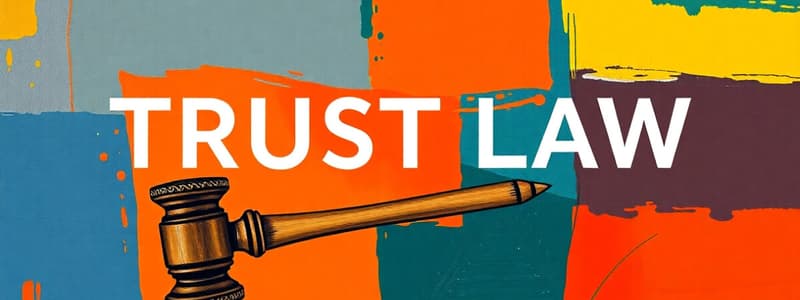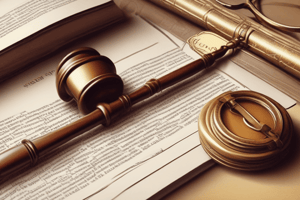Podcast
Questions and Answers
What is the primary obligation of a trustee concerning the trust property?
What is the primary obligation of a trustee concerning the trust property?
- To maximize the financial return at any cost.
- To manage the trust property in a manner that benefits the beneficiary. (correct)
- To comply with all beneficiary requests without question.
- To exercise rights solely for their own benefit.
In the situation where a trustee mismanages trust property, what must they provide to remedy the situation?
In the situation where a trustee mismanages trust property, what must they provide to remedy the situation?
- Personal savings to cover legal fees.
- An apology to the beneficiaries.
- A detailed report to the court.
- Replacement of the trust property or compensation. (correct)
How do the duties of a trustee vary?
How do the duties of a trustee vary?
- They change based on market conditions.
- They depend on the specific nature of the trust they administer. (correct)
- They are influenced solely by beneficiary instructions.
- They are uniform across all types of trusts.
What recourse does a beneficiary have if a trustee breaches their duties?
What recourse does a beneficiary have if a trustee breaches their duties?
In a family trust, what is a primary responsibility of the trustee regarding the assets?
In a family trust, what is a primary responsibility of the trustee regarding the assets?
What is a key factor in determining the nature of a relationship or transaction concerning trusts?
What is a key factor in determining the nature of a relationship or transaction concerning trusts?
Which statement correctly reflects the role of segregation of funds in trust creation?
Which statement correctly reflects the role of segregation of funds in trust creation?
In the case of Paul v Constance, what aspect was crucial for the court's decision regarding the bank account?
In the case of Paul v Constance, what aspect was crucial for the court's decision regarding the bank account?
Which of the following is NOT a significant factor in determining the creation of a trust?
Which of the following is NOT a significant factor in determining the creation of a trust?
What does certainty of intention depend upon in the context of trust creation?
What does certainty of intention depend upon in the context of trust creation?
Flashcards are hidden until you start studying
Study Notes
Determining the Nature of a Relationship
- The nature of a relationship or transaction is determined by the rights and duties it creates, not by how the parties describe it.
Segregating/Earmarking Assets
- Segregating funds in a separate bank account earmarked for a specific person or purpose is often good evidence of an intention to create a trust.
- However, it is neither necessary for the creation of a trust nor conclusive evidence that a trust is intended.
- Segregation and earmarking must be considered in the specific factual context.
Importance of Context
- In the case of Paul v Constance, the court found a trust existed based on repeated use of the phrase “this money is as much yours as mine,” and how the account was used (jointly) by the couple.
- This decision highlights that certainty of intention is determined by the specific facts of a case, and words and conduct must be interpreted in context.
Relationship with Other Certainties
- Certainty of intention interacts with certainty of subject matter and certainty of objects.
- Certainty of subject matter refers to the trust property, which can change without a breach occurring.
- A trustee can sell trust property and invest the proceeds in other property, which does not destroy the trust, it simply changes the trust assets.
- If a trustee is at fault and cannot replace the trust property, they will be personally liable to restore the trust property or pay compensation.
- This compensation will be subject to the trust, and a new trustee may be appointed.
Obligation Component
- A trust must have a trustee, who owns the trust property and has all the rights and powers of legal ownership.
- The trustee must exercise these rights and powers for the benefit of the beneficiary.
Trustee Duties
- The trustee owes equitable obligations to the beneficiary.
- Equity restricts the trustee's right to deal with the property as they choose by placing duties on the trustee.
- The trustee is required to exercise their legal rights for the benefit of the beneficiary.
- If the trustee doesn’t act in accordance with their obligations, the beneficiary can sue the trustee for breach of trust.
Farepak Case
- Farepak went into administration because customers’ money was not subject to a Quistclose trust.
- Mann J rejected the argument that the money was held on trust because it was paid to Farepak for a particular purpose (retail vouchers).
- The business model would have required Farepak to keep all customer money in a separate account, which is implausible.
Extension of Quistclose Trusts
- Quistclose trusts are not restricted to loans or transactions involving money.
- They arise in any situation where property is transferred to a person whose use of the property is restricted to a specific purpose.
Comparing Trusts with Charges
- A charge is a common proprietary security interest, securing the performance of an obligation (usually the payment of a debt).
- The chargor (debtor) creates a charge over their property in favor of the chargee (creditor).
- If the chargor cannot pay the debt, the chargee can compel a sale of the property and use the proceeds to discharge the debt.
Distinctions Between Trusts and Charges
- A chargor can use charged property for their benefit; for example, a homeowner occupying land with a mortgage. A trustee cannot.
- Trust beneficiaries are entitled to the entire trust property; a chargee’s interest is limited to the amount of the debt secured.
Studying That Suits You
Use AI to generate personalized quizzes and flashcards to suit your learning preferences.



